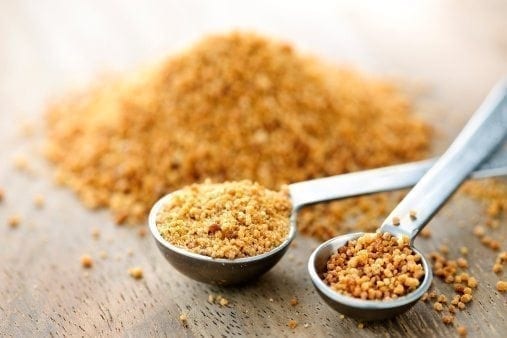Just as the nutrition world is hanging sugar out to dry, some are going coconuts for a “natural” sweetener: coconut sugar. Part of the reason why coconut sugar is so popular could be because it comes from the same tree as its trendy sibling coconut oil. After all, the coconut doesn’t fall too far from the tree, so if coconut oil is touted as healthy, so is coconut sugar, right?
Coconut sugar doesn’t come from coconuts, but rather from the nectar of flowers on the coconut palm tree. This nectar is extracted then boiled to release moisture, which forms the solid product we know as coconut sugar. In the taste department, coconut sugar has a slight caramel flavor, distinguishing it from table sugar and other sweeteners. Nutrition-wise, it’s similar to table sugar, delivering 16 calories per teaspoon.
Coconut Sugar Claims
Coconut sugar proponents claim that it’s more nutritious than other sweeteners, but many of these claims miss the mark because they aren’t useful to the average consumer (like you and me). Here are the top three claims, and why they aren’t that useful:
- It is more “natural” than processed table sugar. Buzzwords for coconut sugar include “natural,” “pure,” “unrefined” and “raw,” but they aren’t helpful since they have little bearing on what happens when we eat the sugar. Both coconut and table sugars are derived from the sweet liquids of a plant source that have been boiled down to yield a sweet solid. This sweet solid is, in both cases, sucrose. Table sugar is 99.9% sucrose. Coconut sugar is about 70-80% sucrose–but that doesn’t make it any healthier. The remaining 20-30% of coconut sugar is largely free glucose or fructose–the same two sugars that sucrose is converted into (during digestion) when you eat sucrose. Gram for gram, table sugar and coconut sugar contain nearly identical amounts of fructose and glucose.
- It has a lower glycemic index (GI). Compared to table sugar, which has a glycemic index (GI) of 60, coconut sugar’s GI is 35, so it’s considered a “low-glycemic” sweetener. The GI is what we use to measure our body’s blood sugar response after eating a particular food. Foods with high GI make our blood sugar spike rapidly after eating them while foods with low GI make our blood sugar spike less or not at all. In theory, it’s better to consume low GI foods if you’re trying to keep your blood sugar balanced but, in practice, it’s muddied. This is because the GI only tells you how one particular food is changing your blood sugar—it doesn’t account for all of the other foods you had at that meal. For example, if you only drank a 12-ounce cola (a high GI food), your blood sugar would shoot up noticeably. But, if you drank this 12-ounce cola with a hardboiled egg and a slice of 100% whole wheat bread, your blood sugar would not spike as much since it’s slowed down by protein, fat and fiber. The lesson? If you want to maintain a balanced blood sugar level throughout the day, pay more attention to the foods you eat than to the sweetener you pick.
- It contains potassium, magnesium, B-vitamins, zinc, iron and amino acids. Great! But what these claims don’t mention is that you need to eat a lot of coconut sugar to get any worthwhile amounts of these nutrients—that is, whatever may remain after processing. Fruits, vegetables, lean meats and whole grains contain more of these nutrients. You certainly shouldn’t expect to get your fill of these vitamins and minerals from a sweetener, so this is not a great reason to trade granulated sugar for coconut sugar.
Verdict: Feeling adventurous for a tasty new sweetener? If so, there’s no reason why you shouldn’t give coconut sugar a try. But, if you’re turning to it for a health boost, we suggest you look elsewhere because, when it comes down to it, coconut sugar is a close relative to good ol’ fashioned granulated sugar. Enjoy it in moderation.




